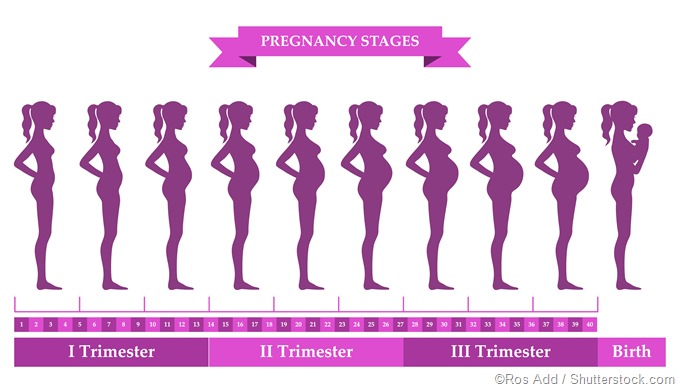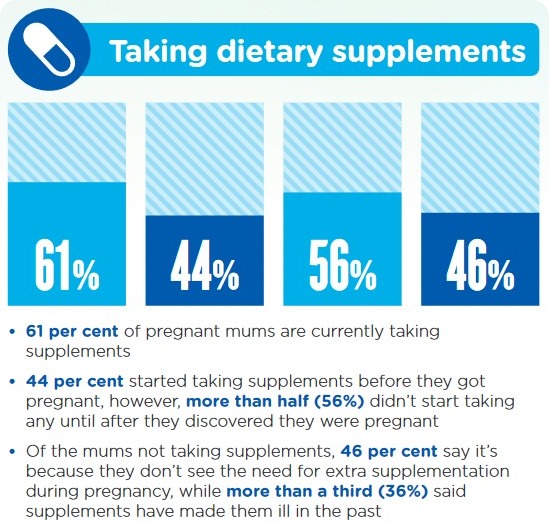
With around half of pregnant women in this country being established as overweight or obese when attending their first maternity check, the experts at the Infant & Toddler Forum have developed this easy-to-follow, practical guide which combines and simplifies the most up-to-date, evidence-based pregnancy information.
The Ten Steps Is suitable for mums-to-be and healthcare professionals and is available online or to download,
Workshop 3 - Ten Steps for a Healthy Pregnancy
Are there are myths about healthy pregnancy you’d like to dispel?
“Eating for Two” is probably the most common myth. In fact, a recent ITF poll revealed just how little understanding mums-to-be have, with almost half (41 per cent) of respondents thinking that it’s OK to “eat for two”. This is simply not the case, and a diet of nutritious foods, not extra food, and a balanced diet is the ideal.

Data from a survey of 1,000 mothers or mothers-to-be, and 150 healthcare professionals, including midwives, health visitors, GPs, lactation consultants and nursery nurses. Credit: ITF
How many additional calories should you be aiming to intake a day in the first, second and third trimester?
Although the requirement for some vitamins and minerals is higher during pregnancy, extra energy from food is not needed during the first two trimesters. Even in the third trimester, only 200 k calories extra are needed. This would be equivalent to around 2 slices of buttered bread, a bowl of breakfast cereal with milk or a bowl of lentil and tomato soup with a roll
How much weight should you gain during pregnancy?
In general, a healthy weight gain should be the aim during pregnancy, and is dependent on your pre-pregnancy weight and height. Expect to gain only 1-4 pounds (0.5 – 2kg) in the first trimester and the rest over the second and third trimesters. More detailed recommendations are shown in a table in the Ten Steps for Healthy Pregnancy resources, based on the American Institute of Medicine recommendations. There are currently no UK evidence-based recommendations.
Are there any foods you should avoid eating altogether during pregnancy?
Extra care over food safety should be taken during pregnancy, and certain foods should be avoided. Foods to avoid include liver, liver pate because they are high in vitamin A and therefore also any supplements that contain high levels of vitamin A , unpasteurised dairy products, soft and blue cheeses, swordfish, marlin and shark.
In addition, tinned tuna should be limited to 4 small servings per week. Extra care also needs to be taken to thoroughly cook meat, fish and eggs; wash all soil from vegetables and fruit.
Do you need to take vitamins and supplements during pregnancy or can you get everything you need from a balanced diet?
All but two nutrients - folate/folic acid and vitamin D – can be consumed by eating a well-balanced, nutritious diet. It is recommended that a daily supplement of 10µg Vitamin D should be taken throughout pregnancy, and 400µg of folic acid prior to conception and until at least the 12th week of pregnancy. Some women will be prescribed 5mg of folic acid per day instead of 400µg.

Data from a survey of 1,000 mothers or mothers-to-be, and 150 healthcare professionals, including midwives, health visitors, GPs, lactation consultants and nursery nurses. Credit: ITF
Is there anything you can do during pregnancy to prevent allergies in your baby?
There is currently no conclusive evidence that any nutritional interventions, supplements and dietary changes prevent food allergies. The greatest contributor to the development of a food allergy is genetic make-up, which cannot be changed. It does remain important to eat a healthy balanced diet as proposed by the 10 steps and not to avoid any food allergens like peanuts, milk, egg etc. whilst pregnant as this will not prevent and allergies, but just affect the mother’s nutritional status.
What causes cravings during pregnancy? Is it ok to eat the foods you crave during pregnancy?
The hormonal changes women go through during pregnancy can have a huge impact on taste and smell, and may explain why some women, but not all, experience strong food cravings and aversions. Although the reasons are not entirely understood, as long as the foods consumed are not on the avoid list, food safety standards are maintained, and the diet is generally nutritious you will probably do no harm.
What advice would you give to women suffering from morning sickness?
For the majority (80 per cent) of mums-to-be, morning sickness is an unpleasant reality. The Royal College of Obstetricians and Gynaecologists have recently published guidelines on how to manage morning sickness, both the severe form and also mild to moderate symptoms. From the dietary point of view, many women find that having a dry piece of toast, plain biscuits or ginger can help ease symptoms.
What practical advice do you have for women planning to become pregnant?
Pregnancy is a wonderful time for mums-to-be to re-think and improve their diet and levels of physical activity. Often, advice may concentrate of what women should not eat or do, instead of what they could do to improve the health and wellbeing both for the mum-to-be and their future son/daughter.
The Ten Steps for a Healthy Pregnancy will help equip women, regardless of their current lifestyle, with practical advice to achieve optimum health during pregnancy, and dispel common myths.
Where can readers find more information?
Readers can find out more from the Ten Steps for a Healthy Pregnancy online resource, which is also available as a downloadable leaflet and more in-depth booklet.
About Dr. Rosan Meyer
 Rosan completed her degree in Dietetics in South Africa and specialised in paediatric nutrition in the United Kingdom, focusing on nutritional support, feeding behaviour and allergy.
Rosan completed her degree in Dietetics in South Africa and specialised in paediatric nutrition in the United Kingdom, focusing on nutritional support, feeding behaviour and allergy.
In 2004 she went on to finish her Masters in Paediatric Nutrition, focusing on paediatric gastroenterology, allergies, nutritional assessment, feeding support and performed research on the use of feeding protocols on the intensive care unit. In 2008, she completed her PhD in energy expenditure in critically ill children at Imperial College London.
She currently runs a busy paediatric allergy practice in London, leads the Food Hypersensitivity Module that forms part of the MSc in Allergy at Imperial College London, and is honorary senior lecturer in paediatrics at the same university.
In addition, she is Chair of both the specialist Food Allergy Group of the British Dietetic Association and the European Section the International Network for Diet and Nutrition in Allergy. She is also webmaster of the Allied Healthcare Interest Group of the European Academy for Allergy and Clinical Immunology and has > 35 peer reviewer publications and 20 book chapters on paediatric nutrition.